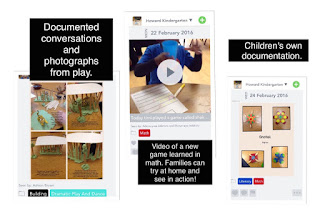We have moved our blog to a new website.
To read this blog and more, please visit:
When looking
through the self regulation lens, including parents and families is not an
optional piece. It is crucial that families are not only considered but
involved in the process.
However, this
does not mean that we front load and overwhelm parents with our new scientific
knowledge of self regulation and our expectations for them to solve the problem.
Rather, it allows us to approach behaviour and things that we are noticing as a
team with a wider scope lens.
Inviting families
in to discuss their children’s behaviour can naturally increase their stress
level. It is important to be aware of this as educators so that we can reduce
their stress through our interactions and our approach to the meeting. The
intention of these meetings should not be to simply tell the parent what is
happening and expect the behaviours to be resolved from their end. If we work
together collaboratively we will be able to build a bigger picture of the
students’ life and gain insight as to how we can work as a team to support
them.
Something we
might say to begin a meeting…
“We wanted to
meet today to talk about S’s stress levels. In our classroom, we don’t see
behaviour as misbehaviour we see it as a sign of stress. Our hopes are that we
can share what we have been seeing and some of the stresses that we have
noticed. It will be helpful to know if you have seen similar behaviours or
patterns at home so that we can brainstorm together ways to reduce their stress
and support them in regulating at both home and school.”
When educators
stress levels are high they can view behaviours as "misbheaviours" more easily.
They may catch themselves critiquing. For example, “their parents must not care
because S never gets enough sleep”.
“A criticism is just a really bad way of making a
request. So why not just make the request?” – Diane Sawyer
This is why it is
crucial that we have such good relationships with families so that when we are
making these requests for help there is a genuine connection and desire to help
the child in reducing their stress.
We spend time at
the beginning of the year making connections with our families in different
ways. We know and understand that with a strong relationship comes trust,
openness and better communication.
We host open
houses monthly to connect with families. During this time, we are able to
connect with families and support them in connecting with each other. We
celebrate the children’s learning and growth as a community.
We also connect
with families briefly during pick up and drop off. We try to share successes to
give them insight from the day.
Video: Parents and Kindergarten (filmed by Atkinson Centre in our Classroom):
We have grown to
love using SeeSaw as a daily communication and connection tool with our
families (SeeSaw Blog). Through SeeSaw we are able to share with families the daily
activities and learning that is happening through the day. Families have shared
that they truly appreciate being able to see their children’s day in action and
feel more connected to what is happening at school.
SeeSaw allows
families to comment back and forth with us and the students. It also provides
conversation pieces to build relationships at home. We have started to share
self regulation strategies that are working for children in the classroom via
SeeSaw (e.g., S listened to music today while drawing to support them in
feeling calm). These small insights provide families with context in the
strategies that we are trying and using with individual children.
“Take it personally;
self-regulation is always personal. Building relationships is the first
principle of practice self-regulation” – Dr. Stuart Shanker



Could you tell us more about the monthly open house? Is it for an hour or a portion of the day? My understanding is that family members are encouraged to play with the students and interact.
ReplyDeleteThe stuff is very nice and helpful! Thanks to providing this info.
ReplyDeletehttps://blog.mindvalley.com/self-regulation/